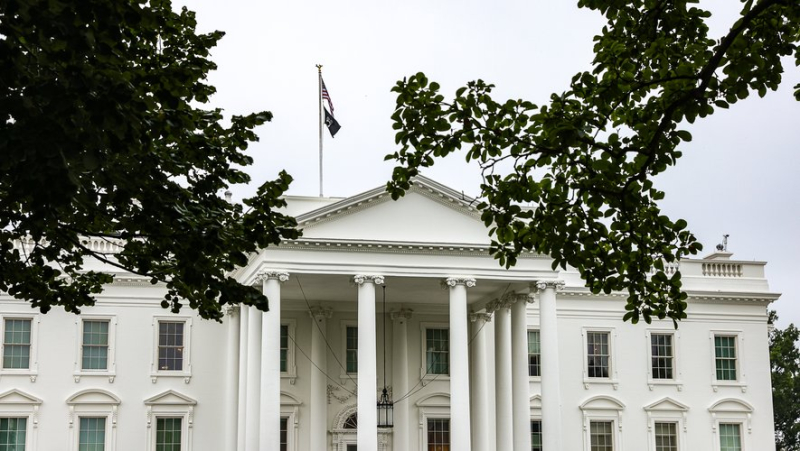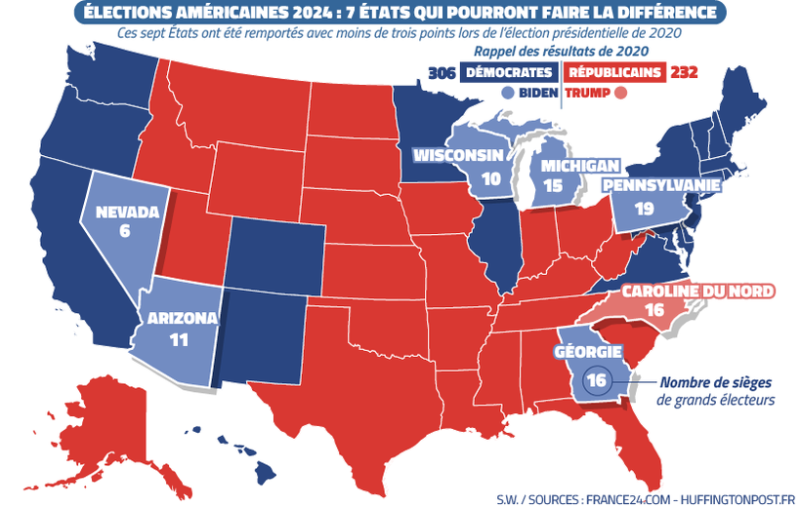US presidential election: Why seven key states should decide the election

La course pour la Maison Blanche passe par sept Etats-clés. dpa – Valerie Plesch
Arizona, Georgia, Michigan, Nevada, North Carolina, Pennsylvania and Wisconsin each have 93 electoral votes. The winning candidate must have 270.
Can a few hundred votes that swing one way or the other in Georgia or Arizona decide the fate of the most important election in the world??
It is very tempting to answer in the affirmative today. Indeed, with less than a month to go before the presidential election, seven particularly undecided states (for the other 43, the question of who will win is not suspenseful) will tip the balance in favor of Kamala Harris or Donald Trump. Hence their name swing-state, as it is used across the Atlantic.
Strategic issue
These are Arizona, Georgia, Michigan, Nevada, North Carolina, Pennsylvania and Wisconsin. Seven states that represent a total of 93 electors, while a presidential candidate needs 270 votes to be able to settle into the Oval Office.
This shows the major strategic stakes of these territories, which the two candidates are crisscrossing in all directions, and where they are spending fortunes on advertising campaigns. Because uncertainty currently remains in each of these seven states.
Where all the polls indicate minimal gaps between the two candidates, never exceeding two points for one or the other (when they are not tied), gaps that systematically remain within the margin of error.
Electors elected in each State
But it is these opinion polls that prove to be the most reliable (and, as the election approaches, they are becoming more so every day), those carried out at the national level (which currently give a slight lead to the Democratic candidate) being in fact less relevant.
We find ourselves here faced with a subject of regular astonishment for those interested in the American presidential election. But it is the Constitution of the United States that decides so, by the grace of a ballot organized by indirect suffrage.

Which means that American citizens elect electors in each state, who then, in turn, once assembled, designate the winner of the election. The decisive and decisive effect of these pivotal states lies in the fact that the candidate who comes out on top in a state wins all the electors in that state. Even if the candidate who came in first only won by a few dozen votes. Hence our initial question.
Can this system continue ?
Which brings up a second question: can this system continue in what is often called the world's greatest democracy, which today appears fractured as never before??
“A modernization of the institutions of American political life is necessary, but that is very complicated”, Guillaume Debré, a former CNN journalist and Washington correspondent, told us last week, with a deep knowledge of American political life, institutions and society, a country where he lived for sixteen years.
“A Constitution that is not more suitable"
And the one who has just published The new Civil War to continue :“The American Constitution is a text that has barely evolved in more than 250 years of existence, and is no longer adapted. Whether it is the representation of the hundred senators (it is no longer possible that Wyoming has the same weight in the Senate as California!), or the electoral college of the presidential election. Two of the last four presidents were elected with fewer votes than their opponent, as was the case for George W. Bush and Donald Trump!”
It remains to be seen whether it is possible to find a majority in the United States to change this text. Guillaume Debré is not exactly optimistic: “Yes, I think there is a majority in the country in favor of changing the electoral college. The problem is that the process is extremely complicated to change the Constitution. You need a two-thirds majority in both assemblies, and then a two-thirds vote in the states. And the political inertia in Washington has become problematic.”
I subscribe to read the rest




